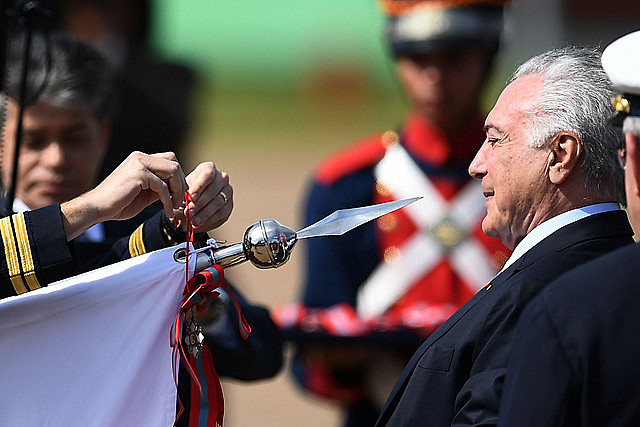While the accusations against Brazil’s ex-president Michel Temer, who was arrested this morning in São Paulo, are very serious, his preventive detention raises questions as it happens in a moment when Operation Car Wash is under scrutiny by the Supreme Court and losing support in public opinion.
Patrick Mariano, a lawyer who has been looking into Operation Car Wash, spoke with Brasil de Fato shortly after the news broke, questioning the legality of the arrest and asks a question: “why now?” Read the interview below.
Brasil de Fato: Ex-president Michel Temer was arrested today. There is still little information about the reasons behind it, but what we do know is that the investigations were originally ordered by the Supreme Court and rejected by Congress [when he was in office]. Are you familiar with the cases? What can you tell us about the arrest?
Patrick Mariano: As it is really very recent, it is unclear what the cases or investigations are, but right now, as I see it, why would a preventive detention be necessary for an ex-president with a fixed home and work? Whose interests does this arrest serve? That is the first question. There is no doubt that there is strong evidence of the ex-president’s involvement in illegal activities, and that’s not new information – it’s been going on for years. So why now? Now that Operation Car Wash is being challenged in the Supreme Court and the media?
Another question that we have to ask is about the work of judge [Marcelo] Bretas [from Rio de Janeiro]. He is known for his illegal decisions and unconventional methods. So I think the timing of the arrest is quite odd.
We would have to look into the records to understand whether there was a pressing need to issue a precautionary warrant of arrest, if his deposition has been taken. So these are all issues we will know more about soon in order to understand whether this arrest was legal or not.
But right now, the timing does look odd.
[After reading the warrant issued by judge Marcelo Bretas, Mariano granted another interview at the Brasil de Fato newsroom, where he explained that the 46-page document was mostly “politically charged,” having only two or three pages dedicated to explaining the reasons for the preventive detention. But the reasons seem insufficient, the lawyer said, as the facts mentioned are not new and date back to two to four years ago.]
What the Supreme Court presented to Congress to start the investigations were serious accusations against the president.
Absolutely. But one thing is to look into the merits of the accusation. There is an accusation of corruption, and that is serious. A different thing is the preventive detention. A preventive detention has to be connected to something the accused has committed in the sense of hiding evidence or trying to cheat the justice system, for example, trying to run away. That is the part I am saying is not very clear.
But I do agree that all facts presented against Michel Temer were very serious and have always been. Actually, you Brasil de Fato and other outlets have been reporting those facts for more than two, three years. So why now?
Another thing that we have to look at is the attitude of judge Bretas, who has been notoriously questionable, and this quest for taking up a leading role right now in this political moment in the country.
The media recently reported that ex-president Michel Temer could take a job abroad, maybe at a university or even a Brazilian embassy. Wouldn’t that support the warrant for preventive detention?
It really depends. A person who is facing charges or an investigation is not forbidden from leaving the country or studying abroad. They can do that. So it really depends on how it happens. One thing is an accused who is facing charges and takes a flight somewhere, and no one knows where they are and they don’t let the courts know where they are when they are called to testify. So it really depends on each specific case.
For example, I think that it is very unlikely that a former president – even though we may question that title – would flee the country like a criminal. Studying or working abroad is not a risk per se. And also the fact of moving to a different country would not mean that the person would not respond to the charges. So it really depends on each specific case. We have to stay collected, because illegal moves that have been committed [by the justice system] against members of left-wing parties many times could happen again.
What we have to pay attention to is how they are doing it. If what they are doing upholds the law, no problem. What we cannot accept is something that is not material. The fact that he is considering moving abroad is not enough reason for a preventive detention. Of course, not considering other facts [that are still unclear].




